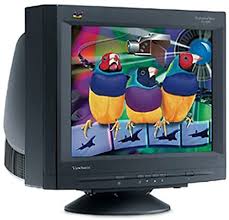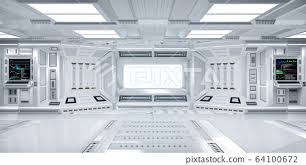Replaceable and irreplaceable technologies
We all understand that technology is developing very fast nowadays. Some mainstream trends that tend to influence manufacturers usually weren’t created at once, they came through decades of evolution and became something like paradigms. Comfort, size, and functionality now have gained control over almost all consumer products, so some items have become extinct or dramatically changed since their invention.
Example of common CRT computer monitor
As for its principle, CRT display is a type of display device that uses one or more electron beams to produce images. They feature a layer of phosphor compounds, which serves as the pixel layer. To produce images, CRTs strike the phosphor compounds with electrons. Electrons essentially excite the phosphor compounds, causing them to illuminate so that an image is produced. (1)
So why they have been replaced? Interesting question… But it’s pretty easy to answer: everything is about comfort and size. The year 2008 was a turning point when the flat-panel displays took their niche on the market. Newcomers were much thinner and their overall size was more convenient for an average user. From size comes comfort and that is why now you can see CRT display only in your grandmother’s village or museum of computer history.
What is more, CRT displays are also prone to screen burn-in. Known as image burn, screen burn-in is a phenomenon in which part of an image is permanently displayed on the screen. Even when the display is turned off, the affected part of the image will be visible. In the past, burn-in was common because most displays used CRT technology. When this problem occurred, the CRT display would have to be repaired or replaced. Flat-panel displays, however, are protected against screen burn-in. They don’t contain phosphor compounds, so they are immune to screen burn-in. (1)
But how about other technologies, were they replaced as well?
Well, no. Not everything. Let’s consider integrated circuits for example. Despite the fact that it was invented in 1961, they are still used everywhere. (2)
Integrated circuits are tiny electronic circuits built to perform a particular function made of active and passive components such as transistors, field-effect transistors, diodes, resistors, capacitors, etc. Though some changes were applied in the development of these circuits, we still use them. Because of the size, reliability, low power consumption, and low-cost IC’s found numerous applications from cars (automotive controls), televisions, computers, microwaves, portable devices like laptops, MP3, play stations, cameras, cellular phones to ship equipment, airplanes, space crafts. Different watches or calculators are only proof for people that is still too early to forget about IC. (3)
References:
1 - http://www.nelson-miller.com/the-end-of-cathode-ray-tube-crt-displays/
2 - https://en.wikipedia.org/wiki/Integrated_circuit



Коментарі
Дописати коментар